Uncovering the Digital in the Caribbean
Uncovering the Digital in the Caribbean
Ariana K. Costales Del Toro
When thinking about the Caribbean, those who are unfamiliar with it might picture beautiful beaches and resorts, a tropical paradise, away from the cold winds of the northern hemisphere. However, when actual Caribbeans think about it, they might reflect on poverty, years of colonization, culture that is threatened everyday and the struggle for survival. The Caribbean reality is anything but Paradise, despite its rich history, customs, cultures, and music. Because of this, studying it through a decolonized lens is essential. It is also important to note that although we often talk about the Caribbean as a group of countries which might imply a close needed relationship through historical relationships and connectors, the countries that compose the Caribbean are rarely in contact with each other on a basic population level in contrast to for example, scholars. As an effect, studying the relationship of the Caribbean countries is important when dealing with topics of decolonization because this distance was indoctrinated into Caribbean by its different colonizers including France, United Kingdom, the Dutch, and the United States. countries were indoctrinated to accept. To create connections and bridges within the Caribbean can then be considered a decolonizing practice, one that already happens on an academic level.
Taking these ideas into consideration while being immersed in the digital humanities field, one can wonder how is it that this practice of bridging is being aided by the help of the digital. Viewing the lack of focus of Digital Humanities within academia, and also considering Puerto Rico and its University’s, lack of Digital Humanities, this anthology aims to explore the digital Caribbean and how their decolonizing efforts can be traced to DH as a medium through which knowledge can reach more people, both inside and outside the countries. Similarly, this anthology hopes to expand the understanding of what “digital humanities” means and what digital projects might look like outside of it basic forms and notions. Considering a DH project does not have to categorize itself as a DH project for it to be a significant digital project for the humanities, what would these works that don’t claim the title “DH projects” look like? Do to DH’s lack of clarity and understanding, this exercise could aid those that solely relate DH projects with archives or digital publishing to understand that a digital project can be anything and can cover a diverse array of topics.
By taking the Caribbean as a focus and exploring its bridging practice through Digital Humanities, the reader and/or audience is not just expanding their knowledge of the Caribbean through a decolonized lens they are also decentralizing the accustomed ways of learning, making the process of research one that is more interactive, multi-media, multi-platform, and multi-genre. In doing this, the annotated bibliography also works to promote these Caribbean digital projects as well as encourage the readers’ contributions to their efforts.
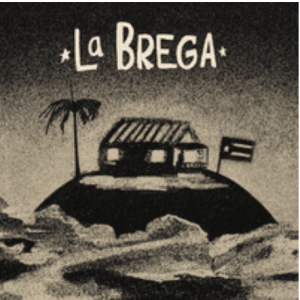
La Brega, first released last February 2021, is a seven-episode podcast that aims to share stories of the Puerto Rican experience, from quotidian things such as the significance of the word “brega” within Puerto Rican slang language which roughly translates to a constant state of survival, to significant political moments that have defined and established the near future of the island’s economical state. The podcast brings forth what it is to be Puerto Rican both culturally and politically, as it states Puerto Rico as a US colony. The podcast takes as focus US involvement on Puerto Rico and how as an effect, the island has become a tax heaven and play ground for the US while the Puerto Rican people suffer the worst consequences. Because of this, the podcast also dwells within the topics of diaspora as it explores how Puerto Ricans have been forced to leave the country. La Brega not only shares Puerto Rico’s history, but it also contextualizes it to the present, analyzing how Puerto Rico’s daily life, which is considered to be a struggle as per stated in the word “brega”, can be traced back to a systematic metaphorical killing that revolves around Puerto Rico’s past and present as a colony, firstly as a Spanish one and then as a US one regardless of its “commonwealth” title. When it was first aired, the podcast caused a lot of commotion both inside and outside the island, stirring emotion in its listeners not only because it used nostalgia while talking about Puerto Rico’s past but because it also dwells with the idea that hope is hard to come by when it comes to the island’s future which is a truth all Puerto Ricans fight with constantly. La Brega became the first Puerto Rican podcast to directly address the political history and present of the island with a researching journalism approach which was at the same time simultaneously translated for maximum outreach. Similarly, the stories the podcast shares are generally contextualized so that people without previous knowledge of Puerto Rico can follow the analysis. Because of this, it not only serves the Puerto Rican people to better understand themselves and their present conditions, but it is also a tool to spread information about the actual political status of the island, severing its false image as a tourism paradise to those who listen.
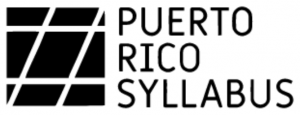
The #PuertoRicoSyllabus is a collective project created by academics exercising their pedagogical skills to help others understand the Puerto Rican debt crisis as well as the island’s “territory” or “commonwealth” status. It also aims to explore and complicate how these topics impact the lives of Puerto Rican people as well as its diaspora. They also explore Puerto Rican social activism. Since its creation the project has birthed eight “syllabi” that structurally discuss topics like Puerto Rico’s history, political structures, debt, migration, and activism, all which have directly or indirectly transformed the way Puerto Ricans exercise democracy. These syllabi are divided into units that compartmentalize the complexities of the topic at hand. Having its primary motive to educate people on the Puerto Rican political atmosphere, #PuertoRicoSyllabus shares accessible information to its readers including but not limited to articles, photos, and videos. Just as a suggested readings section in a syllabus might work, this project works as a list of sources that guides and encourages its audience to research. Aside from this, the project also includes citations of recommended books, not necessarily available for all but still relevant information that could help expand the topic discussed. With its structure and features, the project makes higher-level education more accessible both by providing direct sources of open access materials but by also including summarizes and brief explanations about the material’s relevancy. Aside from this, their website is also bilingual, having both English and Spanish options, increasing its accessibility. Taking into consideration the focus topics of the project, it is important to note how the project tries to decentralize the US imperial debate regarding Puerto Rico’s state status that, as an effect, provides a decolonized lens through which to analyze the proposed materials. Being the first syllabus type project solely about Puerto Rico, #PuertoRicoSyllabus works as a tool for instructors interested in teaching these topics. Because of this, the project aids in the transformation of a better educational system both in the states and in Puerto Rico (in the states, by providing material that is not US centric in its perspective and in Puerto Rico by helping teachers navigate the possibilities of a decolonized class).

Los Muertos de maria bring attention to the terrible way in which the Puerto Rican government managed the effects of the Hurricane Maria within its population. In essence, the website is a data base that recorded the numerous casualties of the hurricane, which at the time, highlighted the mortality rate of Maria being far worse than what the Government was sharing. The project revealed that a year after the hurricane, a more accurate number of deaths were about 487 when the government’s official statement numbered the casualties to 64. The website works as a place of remembrance and protest both of the victims and the governments irresponsibility, respectively. Similarly, the projected pointed towards both the local and federal governments downplay of the casualties relating to the hurricane. Sometime after the project was completed and released to the public, the total victims attached to the hurricane were estimated to 1, 427. This extensive registry, regardless of its incompleteness, proved the government statistics wrong. Being a data base, the project contains a list of names that include some of the hurricane casualties, but also their age at the time of death, the place of death and the cause. Additionally, the website also contains infographics, diagrams, graphs, and tables which shared some of the victims’ stories as told by their relatives. All within a timeline that records important moments after the hurricane. These records showed how the majority of the hurricane victims died of manageable causes if it weren’t for the lack of action from the governments part. The project directly denounced the local government for its inaction and lies while also denouncing the US government’s lack of interest, also bringing to attention the status question. This project further questioned Puerto Rico’s treatment as territory being a colonized Caribbean island.
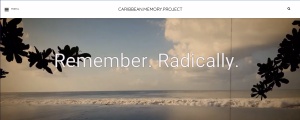
Launched in 2014, The Caribbean Memory Project works as an archive that compilates archival materials from all countries of the Caribbean. The project aims to promote archives to the public while encouraging their participation, effectively engaging people in the preservation of national and cultural knowledge. It is meant to be both an archive and an educational tool through which Caribbean people can learn more about their heritage. The collections are composed of different documents donated, submitted, or uploaded by the project’s public. In other words, the website is made up of family archives, found/discarded materials, and public databases. Being a community-dependent project, the materials digitalized include everything within the limits of image and video files. Some of the documents uploaded include photos of people and architecture as well as letters with old “sent” and “received” stamps. Being a project that depends on the public’s contributions, people are also encouraged to share written and oral stories. Taking this into consideration, it is possible to see how the project not only pretends to include the community into archival work, but it also intends to save and preserve Caribbean history and culture. Besides that, the attention to the preservation of oral histories is important to note knowing that oral stories are the first to get lost between generations. The website’s archive is divided into five categories: country, documents, people, media, and written/oral stories. The category of country is very interesting because it lets the public explore the available archives from the different Caribbean countries, which facilitates analysis of pan-Caribbean connections and patterns. Although some countries have a more extensive archive including pictures of landscapes, important figures, and architecture, it still serves as a starting point when starting to piece the similarities within the Caribbean experience as lived by the people.
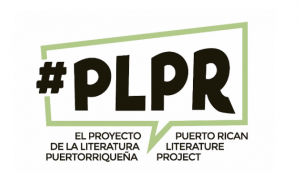
El Proyecto de La Literatura Puertorriqueña/ The Puerto Rican Literature Project
The Puerto Rican Literature Project entails an archive of Puerto Rican writers. As a self-proclaimed accessible project, its website utilizes Spanglish to reach both English and Spanish speakers. Serving as a digital database, the project’s goal is to include 750 Puerto Rican writers (inside or outside the island) within its archive. Being a newly founded project, it estimates it will eventually contain around 50,000 assets, all from the initial 750 writers already stated and varying in genre. Taking into consideration Puerto Rico’s fragile educational system, this project aims to preserve the written works of writers who are not taught in Puerto Rican schools. Because of this, the project essentially works to save the documents the island will one day need if an educational reform is implemented, one that will decolonize the school and include ideas and thoughts from non-white male writers and thinkers. The very existence of this project also enables the possibility of decolonized classes, since it provides a list of resources which could be implemented in the classroom. Besides its ties with education, #PLPR also directs its efforts to the literary community in an effort to preserve the accomplished work that often times goes unnoticed. In addition to this, the project also aims to expand the reading community’s library and knowledge. Although digital projects are commonly understood as ongoing projects, the newness of this one, speaks to the possibilities the future might hold in regard to Digital Humanities in Puerto Rico. Being the only literature archive present in this annotated bibliography, it is important to note how this archive not only preserves written work of the past but also of the present, giving attention to contemporary writers who, in the context of Puerto Rico, have incorporated topics of race, gender and class within their works, making writing a decolonizing exercise. One that the archive supports and reiterates while “immortalizing” them.
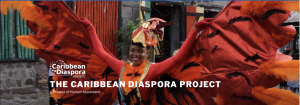
The Caribbean Diaspora Project
With its base in Puerto Rico, the Caribbean Diaspora Project aims to “revitalize, reuse and recover” sources and artifacts related to carnival practices and mobility across the Caribbean. Similar to other digital projects, this one is divided into sections or phases which detail the processes through which the project firstly emerged, was conceived and progressed to its current state. Within these stages, the topics addressed included the origin of carnival, carnival events across the Caribbean, and politics with its relevance to carnival. One of the interesting aspects of the website includes the mapping of the Caribbean and the specific countries the project focuses on (it does not include the entirety of the Caribbean). Besides mapping, the website also contains summaries and portions of analysis which often times makes the project read like an essay. Both of these approaches combined help the reader understand how the project connects its topics to the Caribbean, the topics including not only carnival practices but also migration and how it contributed to similar carnival practices across the Caribbean. In general, the Diaspora Project serves as a representation of research progress since it detailed every step toward the analysis and creation of the project while taking into consideration the reader’s knowledge or lack thereof. Knowing the project incorporates and compares Caribbean countries in its core, it becomes another work through which the reader can explore the pan-Caribbean relationship, especially as it relates to migration patterns across the islands. As a result, the reader might become more interested in reading topics of migration more specifically and how in the beginning of the Caribbean islands colonized history, the first migrations were of black people during and after enslavement (the slave trade being another connection between Caribbean countries).
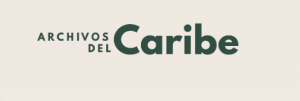
Based in Puerto Rico, the Archivos Del Caribe project or the Archives of the Caribbean (as is translated), preserves and collects materials that represent Caribbean history, art and culture. After receiving a grant of 100,000 the community-lead archive and literature collective has dedicated its focus to compiling and digitizing rural parts of Puerto Rico, specifically one of its municipalities, Cayey. Being a mainly digital photography archive of history, art and culture, the website’s contents are mainly donated contributions or materials received from other collections or open access resources. Aside from its digital archive, Archives also engages their community by organizing exhibitions where locals can interact with the physical archive. In its core, the project recovers quotidian familial histories that form part of Puerto Rican culture and history effectively preserving the experiences of past generations. Aside from its efforts in preserving Puerto Rican knowledge, the project also includes a Caribbean gallery with focus on Puerto Rico, Cuba, and Guadalupe as well as an archive on Caribbean architecture. The Archives gallery, although limited, offers a look at different points in Caribbean history that encourages reflection on what it means to have a Caribbean experience or to live a Caribbean life without romanticizing. Similarly, the archive on Caribbean architecture, begs its audience to reflect on the colonization effects on civil structures since it clearly demonstrates the remnant of a once violent (and in many cases, still ongoing) relationship. These sub-projects breach the distance between the Caribbean islands and put them in conversation. With these collections of photos, it is possible to see the similarities between the Caribbean islands as well as noting their individuality. It is then possible to see how very specific parts of Puerto Rico like Cayey, can similarly portray Caribbean life that, for example, Cuba could represent.
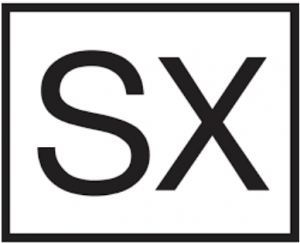
Small Axe Project is a digital project on Caribbean knowledge that aims to amplify Caribbean critical thought, life, and culture. In hopes of creating or aiding transformations of the Caribbean imaginary, both inside and outside as it relates to the perception of said islands. Some of the topics discussed and amplified within this project are class, gender, nation, culture and race, sovereignty, development, and democracy. Small axe Project is divided into three sub-projects or categories: small axe, sx salon, and sx visualitites. Small axe functions as a critical Caribbean journal, sx salon as a cross genre literary platform, and sx visualitites as a space dedicated to Caribbean visual practice including but not limited to photography, moving image, performance, architecture, soundscapes, painting, and sculpture. Small axe project also has a small division for digital practices called sx archipelagos. Small Axe Project’s multigenre and multiplatform uniqueness make this a very complex project which contains many of its contributions in digital form. Small Axe Project as a whole, is both a producer and reproducer of Caribbean knowledge that is, at the same time, digitalized to assure maximum accessibility when possible. This project is important not only because of its multi-genre approach but because, once again, it puts the Caribbean in conversation with itself in order to expand the knowledge already established and ensure conversation continue advancing and complicating themselves as the critical world undoes itself continuously. Both as an educational tool, from where scholars can find scholarly works of critical thought, Small Axe also works as a publisher that enhances the outreach of Caribbean thinkers otherwise forgotten (lack of publishing opportunities)

Carisealand is a digital research project of the first digital humanities center in the Caribbean, Create Caribbean Research Institute. In its essence, Carisealand explores the possibilities of living in the Caribbean amidst a climate change crisis where climate disasters increase the vulnerability of the islands. Being a multi-disciplinary project, it aims to engage topics of social, environmental, and economic impacts as they relate to climate disaster in hopes of arguing, aiding, and establishing how sustainability can help the futurities and survival of the Caribbean. The project is directed to scholars, artists, students, and citizens as it strives to create general awareness of climate change and its impact in the Caribbean. Because of its informational nature, the project serves as a tool for educating the population. Similarly to others, the project is divided into three sections: a mapping section that lists and connects all the environmentally conscious organizations that work within the islands to protect natural resources and wild life, a syllabus portion that directly addresses scholars and students as it functions as a tool for learning about the environment in the Caribbean context, and finally, “ the lab” section which works with the community in order to imagine what a sustainable Caribbean might look like. The lab takes Mahaut, Dominica, and its community, as focus. This project is not only important because it explores how the Caribbean can work towards a more sustainable future but also because the climate change’s impact on the islands is even more noticeable now than it was years before. In recent years climate disasters keep threatening the Caribbean future. Just as we saw in 2017 with Hurricane Maria, storms continue to be a big threat as well as other related nature events like volcanic activity, higher sea levels and erosion, etc. all directly related to climate change. Thus, Carisealand works to ensure the possibility of an actual Caribbean years to come.
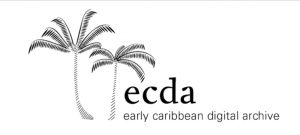
Early Caribbean Digital Archive
The early Caribbean digital archive is a publicly accessible archive that enables accessing, researching and contributing pre-twentieth-century Caribbean materials. The project’s first goal is digitalization of literary history pertaining to the topics of enslaved, Creole, indigenous and colonized peoples. It encourages its users to use the archive as an educational tool to explore further into the colonized education we receive. The project’s website is divided intro three sections: archive, classroom, and exhibits. The archive includes but its not limited to materials relating to Obeah narratives and early Caribbean slave narratives, etc. The Classroom section of the webpage, dedicates its efforts to aid students, teachers and researchers into finding early Caribbean materials and it even includes sample syllabi, assignment/projects and research guides. Similar to other projects, this work aids the evolution of an educational transformation that parts ways from coloniality and ensures a decolonial state of mind that could ensure social and economic development. Finally, the project utilizes an exhibition format with various collections exploring the topics of natural history, Obeah, and music. This project is important because it aims to decolonize the archive relevant to the Caribbean in all its forms. Precisely by taking into focus the narratives and experiences of black Caribbean people, the projects shift its focus to those who have been forgotten and marginalized since the beginnings of colonization through enslavement. As a result, the project puts the black Caribbean in the front of the archive, complete decentralizing which communities get attention and which communities are immortalized through their preservation in digital form.
Conclusion
Throughout the annotated bibliography we have explore Puerto Rico and the Caribbean as well as their relationship, similarities, and ties through the use of digital projects as research holders and actual examples. Knowing Digital Humanities is not yet a standardized field that is wildly accepted and engaged with within academia, this project aimed to incorporate DH works in hopes of answering questions regarding what a digital project is, what it could look like, and how to correctly identify one while addressing topics of coloniality, history and culture within the Caribbean context. In collaboration with these digital works, the bibliography was able to put some projects in conversation with each other, effectively demonstrating the Caribbean works within and for itself in an attempt to expand its knowledge inwards and outwards as well as preserve that which is being forgotten as new forms of knowledge take its place. In various occasions throughout the bibliography, the digital projects listed mentioned or referenced each other and stated their importance in developing other initiatives like for example Carisealand’s syllabus sub-project coming from inspiration derived from #PuertoRicoSyllabus and their efforts to educate their communities as well as others outside of it.
Taking into consideration how these projects often inspire others to collaborate or initiate a project of their own, most of the works listed in this bibliography also encouraged its readers to add to their collections with their own materials, objects passed through generations that are seen with national value, enough to be included in an archive for other folk to see and take as part of their own heritage. In a similar way, these projects also encouraged their audience to suggest or submit ideas to their collections actually engaging their publics to start creating digital work and, in the case, people contribute, the project’s aims to expand the Caribbean knowledge are achieved while also expanding the interest for digital knowledge.
All of these projects served to change the Caribbean imaginary that proposes the islands as paradises made for vacationing and escaping the cold. In other words, the projects elaborated the complexities of living a Caribbean life and being a Caribbean person. The different galleries as well as the various archives showcased how similar and unique the Caribbean countries are by representing their cultures, clothing, architecture, and quotidian aspects of life that often reflect and encourage conversations of race and class. In general, the archives gave way to reflection around the Caribbean economic state and its impoverishment after years of coloniality.
Thanks to these digital projects we were able to see how people are discussing and conversing about topics of politics, history, decolonization, education, environmental challenges, relationships, and culture and how they all converge when talking about the Caribbean experience and its people.

